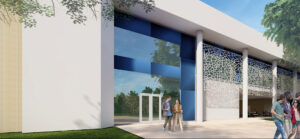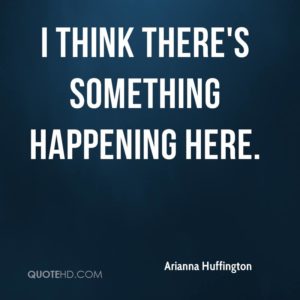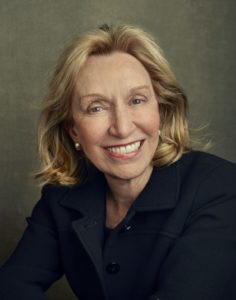
A rendering of the planned Wallach Center at FAU.
We stumbled on an interesting sign during a recent visit to FAU’s Theatre Lab.
The sign announced the future site of “The Kurt and Marilyn Wallach Holocaust and Jewish Studies Building.”
I was intrigued, so I did a little research and learned that the Wallach’s pledged $20 million (with $10 million going to the building) to create an education center dedicated Holocaust Studies, Jewish Studies, human rights, and leadership training.
When looking into the program words like dignity, compassion, human rights, and understanding were peppered throughout the literature.
“This is truly a transformative gift that values the strength of education in combating anti-Semitism as well as hatred and intolerance of any kind,” said Dr. Michael Horswell, Dean of the Dorothy F. Schmidt College of Arts and Letters. “This building will become a living testament and example for thousands of students and community members who pass through its doors.”
Let’s hope so.
As we begin a new year the usual promise of a fresh start is shadowed by an ominous feeling.
Our nation is divided.
Our world is dangerous.
There are conflicts that have the potential to spin out of control. It’s a scary and uncertain time.
When we are faced with these challenges, it seems natural—maybe even logical—to tune them out or try to ignore them. But we can’t.
We just can’t.
We must confront hatred and intolerance. We must step up and defend Democracy, decency, and human rights. Somehow, someway, we must dial down the hate. We have the tools to do so. We just need the will.
There are inspirations and guides everywhere if we open our eyes. People who lead with love and compassion. Organizations that are trying mightily to overcome those who seek to foment hate and divide us.
We must rise above.
Over the holidays, we watched the Kennedy Center Honors which included the great Billy Crystal.
Mr. Crystal was lauded for his comedic chops, his many hit movies and for the longevity of his career. It was great to see scenes from “When Harry Met Sally” (which is the perfect romantic comedy) and “City Slickers” which was a boon to dude ranches everywhere.
But what struck me most was Whoopi Goldberg’s tribute to her friend. She invoked a concept called “tikkun olam”, which is a Hebrew phrase that calls on us to heal and repair the world.
She said Billy Crystal was all about tikkun olam, doing right by people, healing the world in his own way through humor.
My grandparents and parents did not use that term when I was a child. But they encouraged my sister and I to be “mensches.”
A mensch is someone who tries to do the right thing—always.
In a world in need of repair, we need mensches more than ever. I’m hoping the Wallach Center mints mensches.
Here at home, we are heading to yet another election season where voters will be hard pressed to choose amidst the nasty rhetoric and flat out lies about candidates. Lost in the cacophony of mail, social media wars and robocalls are serious discussions about important issues. We don’t debate ideas; we don’t talk about challenges, and we don’t seem to be discussing opportunities either.
What a shame.
Candidates vow to “fight development”, “cut taxes and spending” and find “innovative solutions to traffic.” But we don’t see the details, do we? We never see the details.
You’re going to fight development? Ok, what are you going to do to provide housing? Are workers supposed to magically appear to serve you in restaurants, dress your wounds in the hospital and teach your kids and then just vanish? Don’t they need places to live?
You say you are going to cut taxes and spending? Wonderful! What are you going to cut? Roughly half the budget goes to police and fire, do you want to invest in those critical departments or do you want to lose our best to nearby agencies who are always hiring and always looking for great cops and firefighter/paramedics.
Then there’s traffic.
What are your solutions? More lanes? That doesn’t work.
You’re going to vote to stop that new apartment complex? Great, so our workforce gets to clog our roads driving from elsewhere when they could be living in town close to their jobs.
Everyone one of the challenges I mentioned are real and every one of them can be made better with detailed analysis, strategic decision making and the political will to involve the community and then stick to your guns when the critics fire up their laptops and call you a turd on Facebook. And you can count on that happening.
I know I’ve been rambling a little here…just taking my mind out for a spin. Thanks for bearing with me.
I’ll conclude with something else I saw over the recent break. I opened the sewer they now call “X” and was greeted by some hate-filled hack barking about Kwanzaa. Apparently, this holiday didn’t cut it for this charmer. It wasn’t “real”, it was “offensive” and “fake.”
I feel sorry for this person. I do. She was so unhappy with Kwanzaa that she had to share her venom with the twitterverse.
Like magic, a longtime resident, began posting about Kwanzaa on Facebook. Each day, he explained the principles of Kwanzaa. I had seen them before, but I had forgotten what I had learned. The posts allowed me to revisit the principles and because they were served in daily doses, I was able to think about them and process their meaning.
My favorite was UJIMA (oo – GEE-mah): Collective Work & Responsibility. Here’s how it was explained.
“Collective Work and Responsibility reminds us of our obligation to the past, present, and future, and how that will affect the role we play in the community, society, and world,” he wrote.
“As residents of “The Set.. (a historic neighborhood in Delray) we must make our neighbors’ issues our collective responsibility. By doing this, we can solve our struggles together. Each one, teach one.
To transform into the Beloved Community envisioned by our ancestors, each resident must buy into the principle of “Ujima”. We must care for – our public spaces, children, elders, history, and institutions. The health and welfare of The Set is the responsibility of all residents.
Our personal sense of Beloved Community is the key to successfully transforming our neighborhood. Each resident must love and care for The Set and pass the legacy on to our children. The Set must be recognized as unique and something to be protected.”
Well said.
I like the notion of collective responsibility. I agree we have an obligation to the past, present and future. We are called to heal the world. Let’s get after it.







